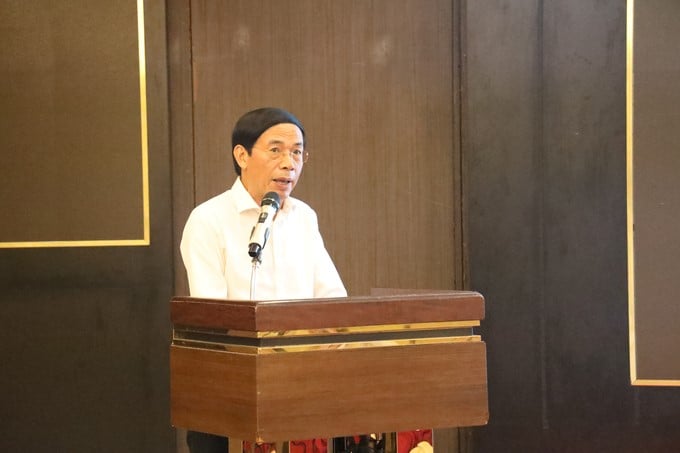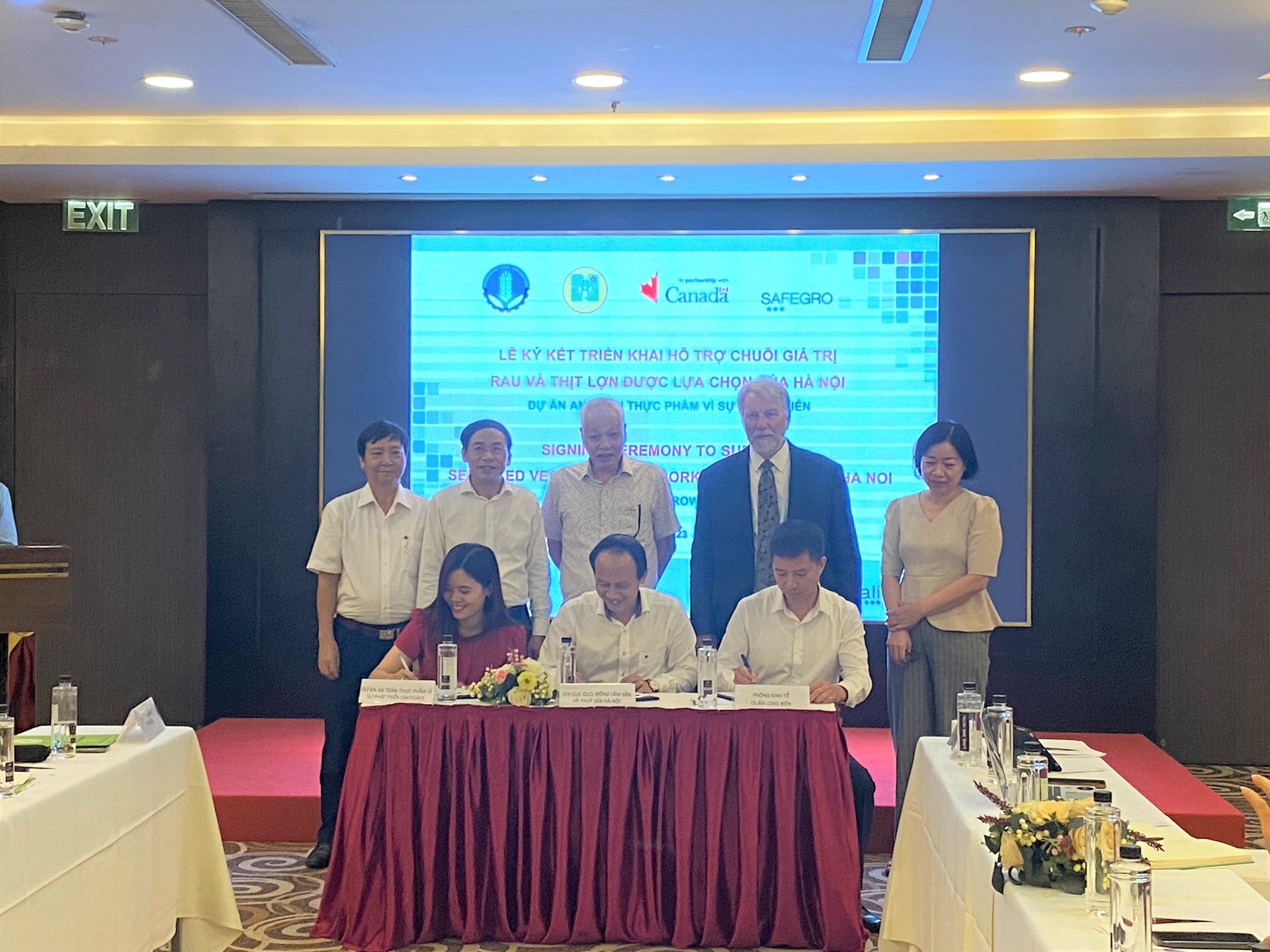June 18, 2025 | 16:49 GMT +7
June 18, 2025 | 16:49 GMT +7
Hotline: 0913.378.918
June 18, 2025 | 16:49 GMT +7
Hotline: 0913.378.918

Mr. Nguyen Ngoc Son, Deputy Director of the Hanoi Department of Agriculture and Rural Development. Photo: Organization Committee.
This is a coordinated activity between the Department of Quality, Processing, and Market Development (Ministry of Agriculture and Rural Development) and the Hanoi Department of Agriculture and Rural Development in the project "Safe Food for Growth" (SAFEGRO) sponsored by the Canadian Government.
The vegetable and pork chain agents selected for deployment in the first phase include vegetable chain from Van Duc Cooperative (Gia Lam); pork chain from Hoang Long Cooperative (Thanh Oai); Van Duc Market (Gia Lam); and Kim Quan Market (Thuong Thanh, Long Bien).
Mr. Nguyen Ngoc Son, Deputy Director of the Hanoi Department of Agriculture and Rural Development and Head of the Hanoi Working Group said that since 2015, the Ministry of Agriculture and Rural Development (MARD) and the Hanoi City People's Committee have signed the "Coordinated Program to Develop the Supply Chain of Safe Vegetables and Pork for Hanoi City in the 2015–2020 period," followed by the "Coordinated Program to Ensure Food Safety and Improve Quality and Value of the Agro-Forestry-Fishery Supply Chain between Hanoi City and Other Provinces and Cities Nationwide in the 2021–2025 period."
As of now, Hanoi City has built and developed 159 chains from production to consumption of agricultural, forestry, and fishery products. Of these, 53 product chains were derived from animals and 106 from plants.
These chains initially attracted many businesses, cooperatives, and farmers to cooperate. Some of these are organized in a closed manner from production, preliminary processing, and processing to product distribution and consumption, thereby creating strong brands in the market, such as pork from Hoang Long Cooperative, Bao Minh rice, Chuc Son safe vegetables, eggs from Tien Vien JSC, mushrooms from Kinoko Company, etc.
The city has also signed cooperation agreements with 43 provinces and cities to develop more than 900 linkage chains in production, consumption, promotion of regional products and specialties, and support for goods circulation in the area. Since then, the problems with the food safety of agro-products brought into Hanoi have partly been controlled radically.
The project "Safe Food for Growth" supports vegetable and pork chain agents not only in technical elements of food safety according to international standards but also in contents of production and linkage according to value chains; production development in the direction of sustainable environmental protection; advanced technology applications to adapt to climate change; and digital transformation. The project also supports chain agents in building product brands and labels; increasing the value of agricultural products; community monitoring and gender equality; and raising awareness of communication, education, and culture in terms of food safety.

Hanoi City is committed to ensuring food safety for the people. Photo: Organization Committee.
The SAFEGRO project will support a number of pieces of equipment to control and improve food safety. Producing executive cooperatives will be supported by the project to build a digitized system of production plan management and a system of traceability. At the same time, the cooperatives are also supported in developing a set of regulations and establishing a community monitoring group with the participation of good farmers. This support aims to monitor, manage, and guide farmer households to produce and pre-process safely in accordance with the provisions of quality management systems according to international standards.
The difference in the SAFEGRO project’s implementation activities is the participation of the entire community ecosystem (kindergarten, primary school, high school; Women's Union, Farmers' Union, residential groups, market management board, etc.). The supporting contents are implemented in three phases. To be more specific, Phase 1 supports upgrading the value chain; Phase 2 supports and verifies the model; and Phase 3 summarizes, evaluates, and replicates the model. The project's support period is expected to last until 2025.
According to Mr. Nguyen Nhu Tiep, Director of the Department of Quality, Processing, and Market Development and Deputy Head of the Project Steering Committee, ensuring food safety is a step towards realizing the dual goal of ensuring people's health and sustainable development. Currently, there are more and more international and Vietnamese regulations on food safety, so we have to control everything from production to preliminary processing, processing, and consumption of agricultural products on the market.
Translated by Huyen Vu Thu
/2025/06/17/3942-2-143243_548.jpg)
(VAN) Recently, in Sweden, the Secretary of the Binh Dinh Provincial Party Committee presented the Investment Registration Certificate for the 'Polyester Fabric Recycling Complex' project to SYRE Impact-AB Company.
/2025/06/12/3721-2-202745_83.jpg)
(VAN) TH made an impression at Seoul Food 2025 with its line of natural beverages, paving the way for Vietnamese food products to enter the South Korean market.

(VAN) Soc Trang's success in rice exports stems from a strategy of developing fragrant and specialty rice cultivation areas and standardizing production toward low-emission practices.
/2025/06/11/1311-5-120811_839.jpg)
(VAN) The pig farming industry is facing the challenge of comprehensive restructuring to meet requirements for quality, safety, traceability, and market expansion both domestically and for export.

(VAN) Vietnam considers participating in ALGROALBA in order to expand agricultural production, coordinate the assessment and effective exploitation potential land.
/2025/06/05/5314-1-184727_407.jpg)
(VAN) From seemingly worthless fish scales and skin, enzymes and lactic ferments can transform by-products into peptides, opening a sustainable, effective business direction and elevating Vietnamese seafood.

(VAN) TTC AgriS and IFC signed a strategic partnership to develop a sustainable agricultural value chain, aiming to achieve the Net Zero target by 2035.